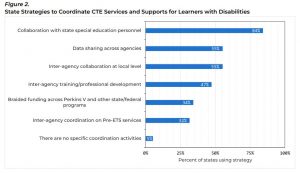Career Technical Education (CTE) offers all learners the opportunity to build academic, technical and employability skills that will prepare them for a future in a dynamic and changing world. Learners with disabilities in particular benefit from CTE coursework in high school. Research shows that CTE provides opportunities to improve employment and postsecondary outcomes for secondary learners with disabilities and has led to higher rates of on-time graduation and more competitively paid jobs.
States play a critical role in supporting the conditions for learners with disabilities to access high-quality CTE programs, successfully complete them, and then transition into high-wage employment. Last year, Advance CTE partnered with the University of Massachusetts Chan Medical School to research how states are supporting learners with disabilities in CTE and what could be done to improve access and success.
We learned that, with the recent implementation of the Strengthening Career and Technical Education for the 21st Century Act (Perkins V), states are well positioned to make progress on their equity goals. In fact, among the 38 respondents surveyed for the study, 84% reported plans to leverage Perkins V to support access and success for learners with disabilities. Their commitments are supported by strong state-level partnerships among CTE, special education and vocational rehabilitation, many of which were forged and strengthened through the Perkins V planning process.
However, inter-agency plans must be supported with coordinated work, actionable data and targeted interventions to make them operational. While strong relationships exist at the state level, they do not always lead to coordination on the ground. For example, states were less likely to report sharing data, offering integrated professional development or braiding funding.
 In part, states’ efforts to expand access for learners with disabilities are stymied by data quality challenges. While states are required to collect and report CTE data disaggregated for learners with disabilities, many states do not further disaggregate CTE data by disability type. Disaggregating data by disability type is important because the supports and/or accommodations needed by learners with disabilities will vary depending on the nature of their disability. The Individuals with Disabilities Education Act already requires the collection of student data by disability type, which means that all states and localities should be able to partner with their special education colleagues to obtain more accurate and nuanced data on the number of learners with disabilities.
In part, states’ efforts to expand access for learners with disabilities are stymied by data quality challenges. While states are required to collect and report CTE data disaggregated for learners with disabilities, many states do not further disaggregate CTE data by disability type. Disaggregating data by disability type is important because the supports and/or accommodations needed by learners with disabilities will vary depending on the nature of their disability. The Individuals with Disabilities Education Act already requires the collection of student data by disability type, which means that all states and localities should be able to partner with their special education colleagues to obtain more accurate and nuanced data on the number of learners with disabilities.
Finally, while states have made considerable progress strengthening CTE program quality and expanding opportunities for advanced coursework, industry-recognized credentials and work-based learning, program improvement efforts are often generalized to all learners instead of targeting specific learner populations. Less than half of respondents say they provide accommodations to learners with disabilities participating in credential examinations, and only 24% indicated they are part of other statewide initiatives to improve credential attainment among learners with disabilities. More direct interventions and investments may be necessary to support learners with disabilities to access and earn credentials with value in the labor market.
Clearly, states are well positioned to expand access and support success for learners with disabilities in CTE. To operationalize their commitments, state CTE leaders should make sure to coordinate directly with their colleagues in other agencies, improve the quality and relevance of their data, and target interventions to learners with the greatest need. Read more about the survey findings in the new report Advancing Employment for Secondary Learners with Disabilities through CTE Policy and Practice.
Kate Kreamer, Deputy Executive Director
